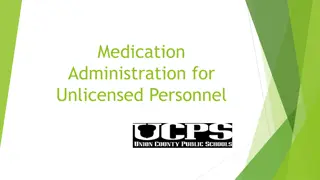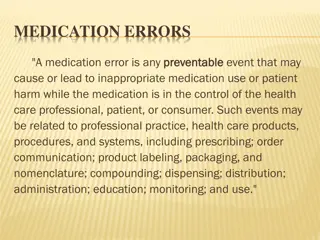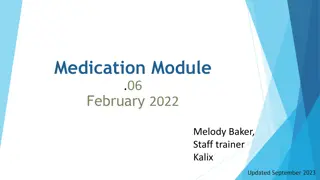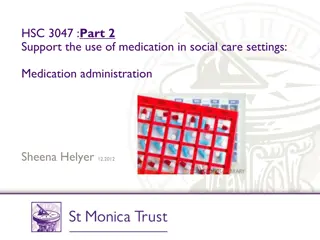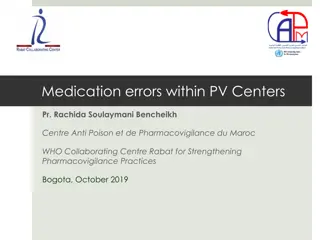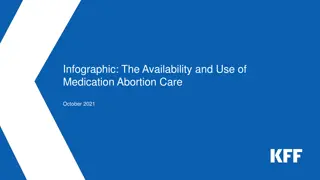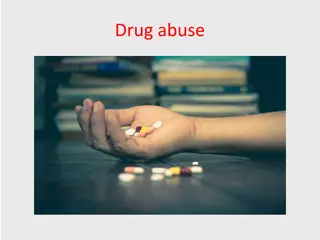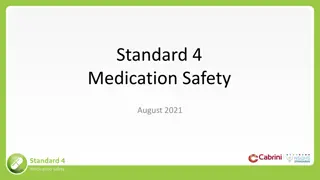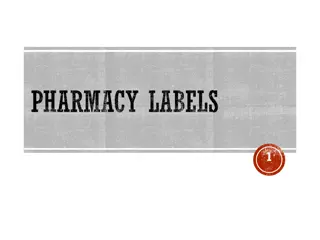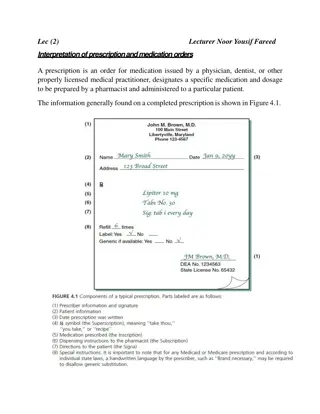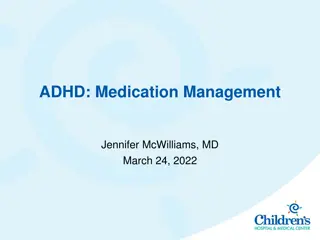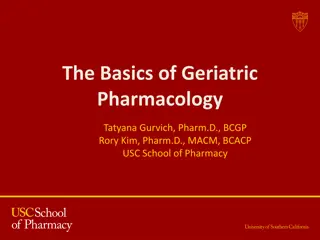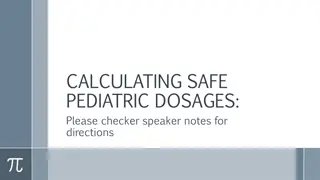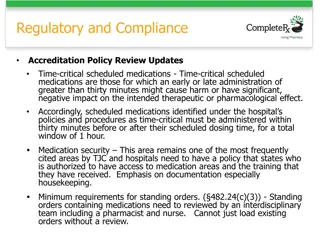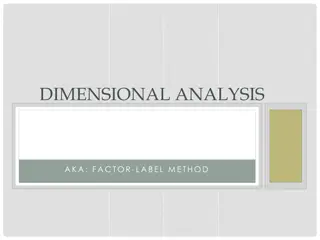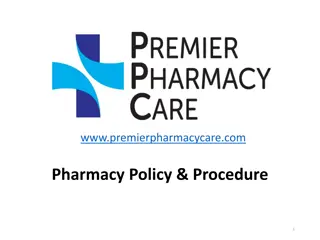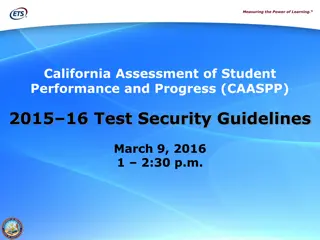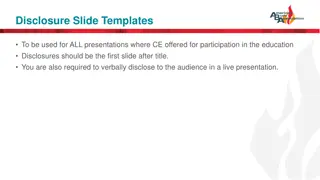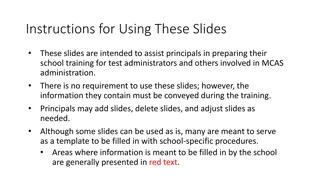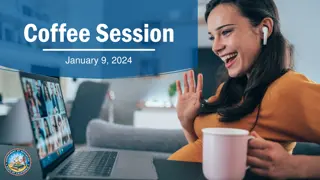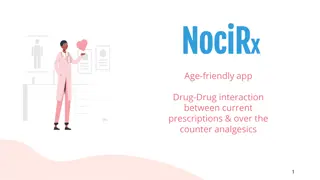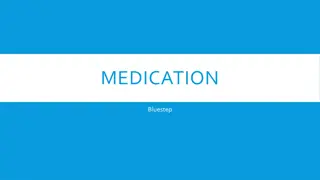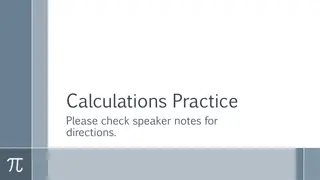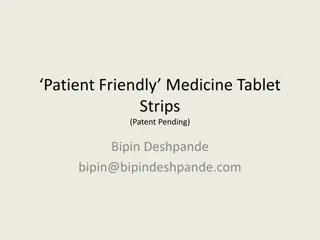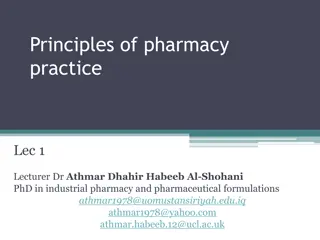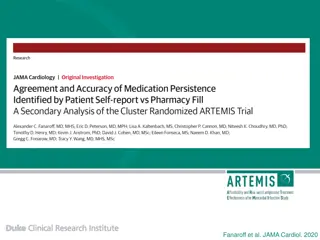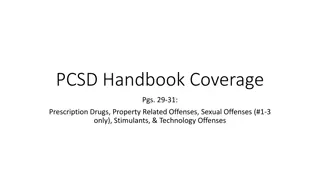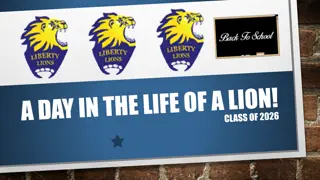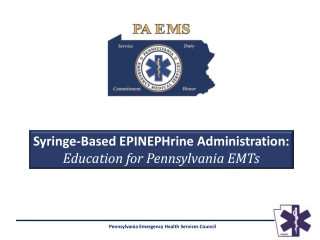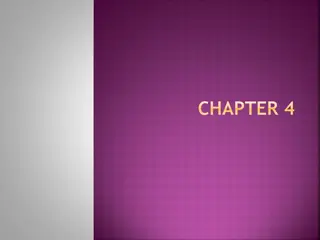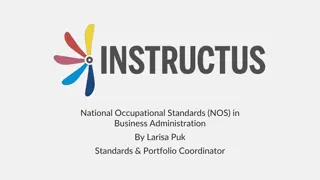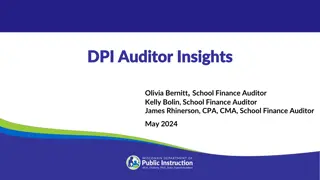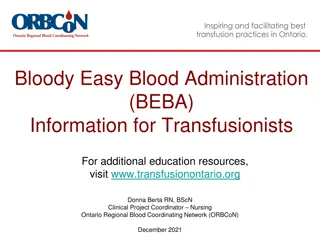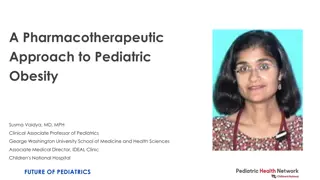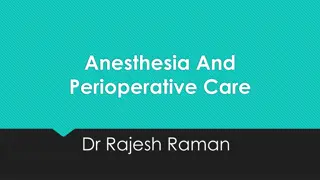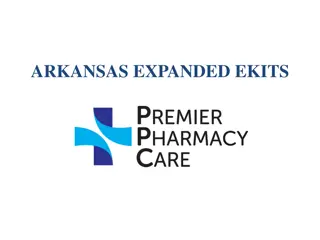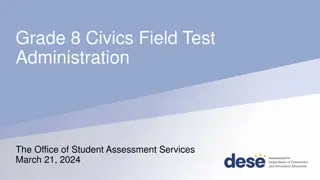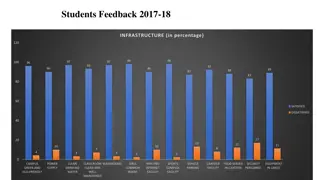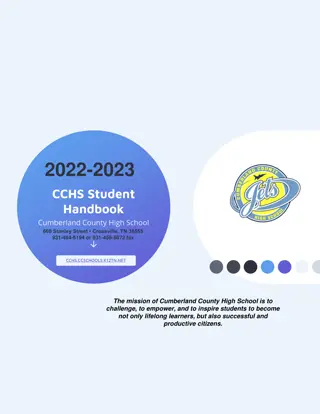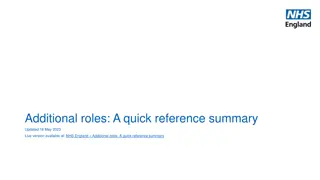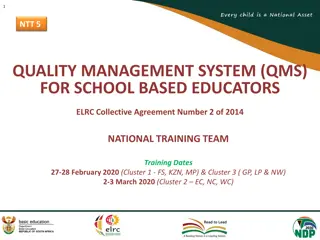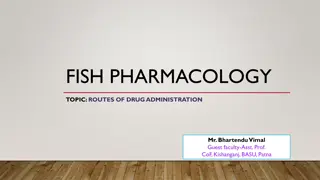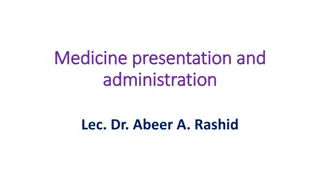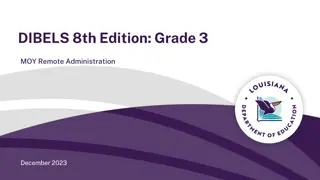School Medication Administration Training Guidelines
Legal requirements and policies for administering medications in schools are outlined, including training for designated personnel and procedures for student self-medication. The guidelines cover medication administration during school activities, transit, and before/after-school care for students with specific health conditions. Details on prescribers, non-prescription medication rules, and FDA-approved protocols are also provided.
Download Presentation

Please find below an Image/Link to download the presentation.
The content on the website is provided AS IS for your information and personal use only. It may not be sold, licensed, or shared on other websites without obtaining consent from the author. Download presentation by click this link. If you encounter any issues during the download, it is possible that the publisher has removed the file from their server.
E N D
Presentation Transcript
Medication Administration A Training for School Personnel 2018 Update
LEGAL BACKGROUND ORS 339.866-339.874 OAR 581-021-0037 Designated school personnel District procedures must address how to handle field trips and other events that occur outside the usual school setting.
POLICIES & PROCEDURES Each school district shall adopt policies and procedures that provide for: Administration of medications to students by trained personnel; Student self-medication
POLICIES & PROCEDURES Must include a process to designate, train and supervise appropriate personnel for medication administration that takes into account when a student is: in school at a school sponsored activity under the supervision of school personnel in transit to or from school or school- sponsored activities.
POLICIES & PROCEDURES When a student has a diagnosis of severe allergies, adrenal insufficiency, and/or asthma, district policy must also address when a student is: In before-school and after-school care programs on school-owned property
MEDICATION Definition
PRESCRIBER Doctor of Medicine or Osteopathy (MD/DO) Physician Assistant Nurse Practitioner Dentist Optometrist Naturopathic Physician Pharmacist
NON-PRESCRIPTION Definition Written permission form Dosage consistent with manufacturer s guidelines Necessary for student to remain in school Original container Transport of medications to/from school
NON FDA-APPROVED NON-PRESCRIPTION Requires signed parent permission, but also a prescriber order that includes: Name of the student Medication name Dose Method of administration Frequency Special instructions Reason why it is necessary for the child to receive during school hours Prescriber signature
PRESCRIPTION Prepared and labeled by a registered U.S. pharmacist Original prescription bottle. Requires written instructions from an Oregon prescriber. A prescription label meets this requirement. Requires written permission from parent (or from student, pursuant to ORS 109.610, ORS 109.640, and ORS 109.675). Verbal orders/out of state. Only administered if required to be given during school hours or at school-sponsored activities (based on prescribed frequency). Age of consent.
THE SIX RIGHTS OF MEDICATION ADMINISTRATION Right Student Right Medication Right Dose Right Time Right Method of administering the medication Right Documentation These must all be RIGHT before any medicine is administered
RIGHT TIME Parent written authorization for any medication must include a time for the medication to be given. Ideally the medication is to be administered at the time specified. However, medicine may be given up to 30 minutes before or after the time specified and still be the Right Time.
HANDLING Water source Hand washing Avoid touching the medication Gloves
HANDLING Cutting tablets Pill crushing Parent responsibility to provide calibrated measuring device for measuring any liquid medications.
ADMINISTRATION METHODS Oral (by mouth) Tablet Capsule Syrup, Elixir, Suspension
ADMINISTRATION METHODS Topical Skin Eyes Ears Nose
ADMINISTRATION METHODS Inhalers Nasal Oral Each Metered Dose Inhaler (MDI) has different use and care, priming, shaking, and cleaning directions. Review insert instructions before use.
ADMINISTRATION METHODS Not covered in this training: Rectal medications Inhaled medication by nebulizer Nasal medication for seizure disorders Injectable medications Oxygen therapy If a student requires medication by these methods, your school nurse will initiate an individualized procedure and train appropriate personnel.
SAFE STORAGE & HANDLING Original container Secure, locked storage Never administer medications from an unlabeled container. Never accept medication in a bag or unmarked container.
SAFE STORAGE AND HANDLING Refrigeration Emergency plans
SAFE STORAGE AND HANDLING Transport of medication Medication changes: we cannot accept verbal requests End of school year Medication disposal
COUNTING PILLS Some pills require counting by 2 people upon sign-in and sign-out, and additionally as required by district policy Any controlled substance: Sedatives Stimulants Anti-convulsive Narcotic analgesics Pyschotropics May count with parent & staff, or 2 staff members
CHARTING FORMS School District Name AUTHORIZATION FOR MEDICATION ADMINISTRATION BY DESIGNATED SCHOOL PERSONNEL Student s name: Birthdate: Grade: I give school personnel permission to administer medication(s) per the following instructions: (Please do not skip any questions) Start date: End date: ____ Medication: Non Prescription Dose (strength/how much): Prescription Frequency (how often): Pharmacy Name: Time of day for meds at school: Prescription Number (if applicable):____________ Route (circle one): Mouth Ear Eye Nose Skin Reason for medication: ALL MEDICATION MUST BE IN ITS NEWEST ORIGINAL CONTAINER WITH AN ACCURATE LABEL Special Instructions: I understand I am responsible to provide this medication and maintain the supply as needed. All medication must be provided from home and must be contained in its original-labeled container. I understand that I am responsible to notify the school in writing of any medication changes, and that all staff-administered medications are to be brought to and from school by a parent or guardian (of the student in specific situations). All unused medication must be picked up by the last day of school. I understand that any medication left at school will be discarded. Parent/Guardian (or student) Signature: Date: ___________________ (This authorization applies only to the medication listed above for the duration of treatment of school year. My signature also authorizes an exchange of information as necessary between the school nurse, appropriate school personnel, and/or the prescriber of this medication.) PRESCRIBER DIRECTION (Required in writing or on pharmacy label for all prescription medications and non-FDA approved OTCs) I have prescribed the above medication for the student whose name appears at the top of this form ____Instructions from the parent are accurate. Please allow this student to carry and self-administer this medication. (Student must be developmentally and behaviorally able to self-administer.) ____I certify that this medication is necessary for the student to remain in school. Special instructions including adverse reactions and action required: Prescriber s Name (please print/stamp) Prescriber s Signature Clinic Name and Address _ Phone Effective Date
DOCUMENTATION Personnel must document every time a medication is given. Documentation must be accurate, legible, and completed at the time of the administration. Document in blue or black ink only - No pencil. If a mistake is made in charting, cross out with a single line and mark ME (mistaken entry); do not use white out.
STUDENT SELF-ADMINISTRATION No assistance required No documentation required Self-administration form School Nurse/Administrator approval
STUDENT SELF-ADMINISTRATION DISTRICT NAME SELF-MEDICATION AGREEMENT Students who are developmentally and/or behaviorally able, will be allowed to self-administer medication, subject to the following: 1)This Self-Medication Agreement form must be submitted for all self-medication. Self-administration of non-prescription medication requires this form and permission from a school administrator. (Self-administration of non-FDA approved medication must include a written order from a prescriber) Self-administration of prescription medication requires this form, and permission from a school administrator and either a RN practicing in the school setting or a prescriber. Prescriber consent can be included on the prescription label or on this self-medication agreement form. 2)All medication must be kept in its appropriately labeled, original container as follows: Prescription labels must specify the name of the student, name of the medication, dosage, route, and frequency or time of administration and any other special instructions. 3)Sharing and/or borrowing of medication with another student is strictly prohibited. 4)Permission to self-medicate may be revoked if the student violates school district policy governing administration of medication and/or these regulations. Additionally, the student may be subject to discipline, up to and including expulsion, as appropriate if the self-medication policy is violated. Student Name: I have read and agree to the above criteria and give permission to self-administer: Name of medication: Signature: (My signature authorizes an exchange of information as necessary between the school and the prescriber of this medication for the purpose of information relating to this medication.) Date: I agree to comply with the above criteria: Student Signature: (if not already signed) Please allow this student to self-administer this medication. (Student must be developmentally and behaviorally able to self-administer.) Date: Date: Prescriber or RN Signature: (Required for prescription medications or non-FDA approved OTC) This student may carry and self-administer this medication as prescribed This student may self-administer this medication as prescribed, but the medication will be kept in the office. School Administrator s Signature: Date:
CONFIDENTIALITY Student medication records are confidential. Files should be locked with the medications and access limited to authorized school personnel. Parent written authorization is required for release of protected student information.
RECORDS RETENTION Medication records should be filed at the end of the school year. Place record in student s health folder in the cumulative file. If medication administration is included as a related service on an IEP, the medication record is placed in the Special Education file for the student.
ERRORS & UNEXPECTED SITUATIONS Report medication errors immediately to the parent, building administrator, and the school nurse. The following actions constitute an error: Medication not given Medication administered to wrong student Wrong medication or wrong dose given to student Medication given at wrong time Medication given the wrong way or route
ERRORS & UNEXPECTED SITUATIONS If student does not receive medication within a half hour of the scheduled time: document, and notify parent and school nurse. If student refuses medication: ask for reason, encourage, document, notify parent and school nurse. If student vomits or spits out medication: document, notify parent, send home if ill. All medication has the potential for side effects. Report any unusual symptoms or behaviors to school nurse and parent immediately.
FIELD TRIPS OR OFF-CAMPUS ACTIVITIES If a medication is to be administered when students are on a field trip or off-campus activity, personnel trained in medication administration must accompany the student group. Any/all medications taken on the activity must be kept in their original container. Medication-trained personnel will sign the medications out, and then back in, and document any administration upon return to school.
QUESTIONS? THANK YOU


